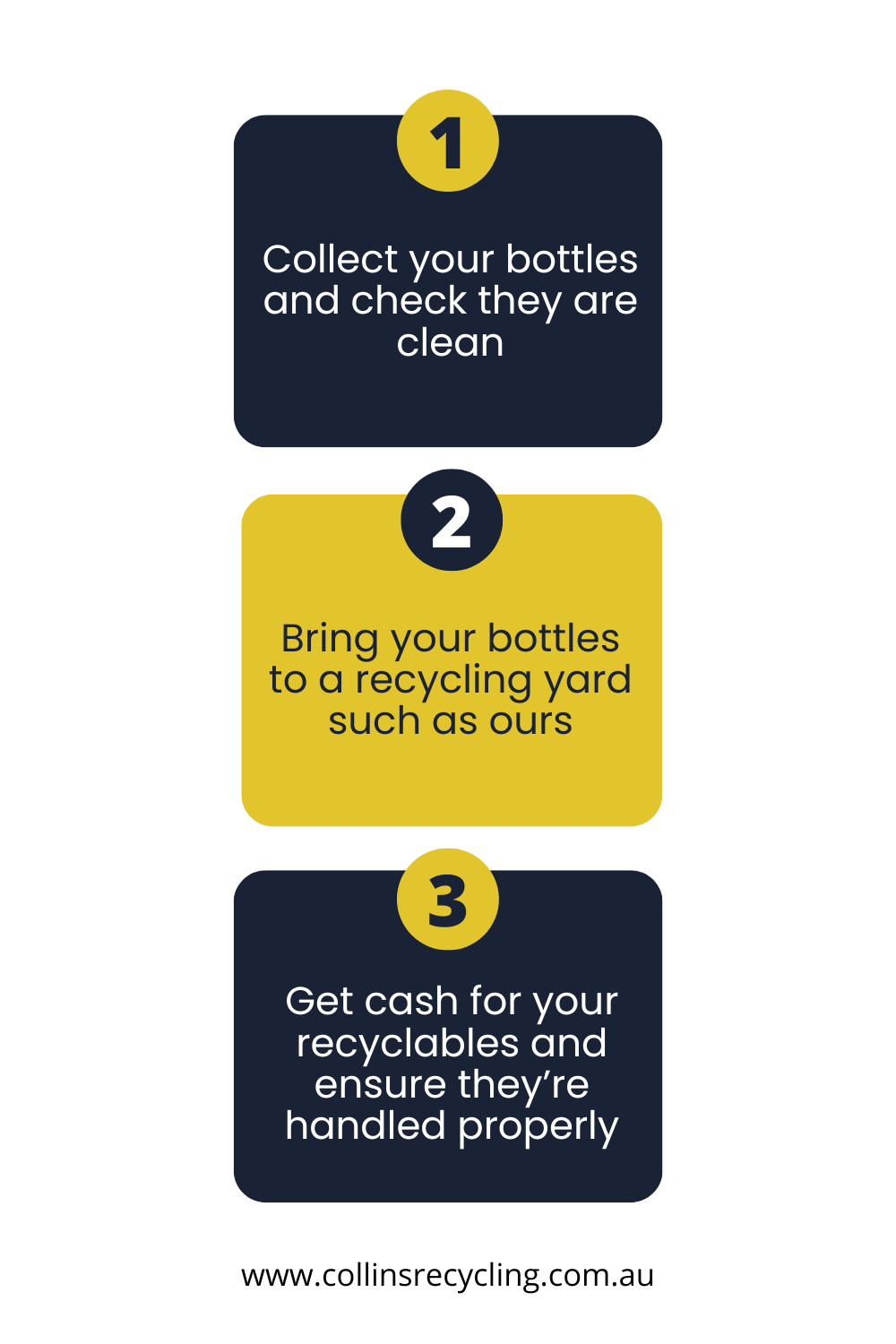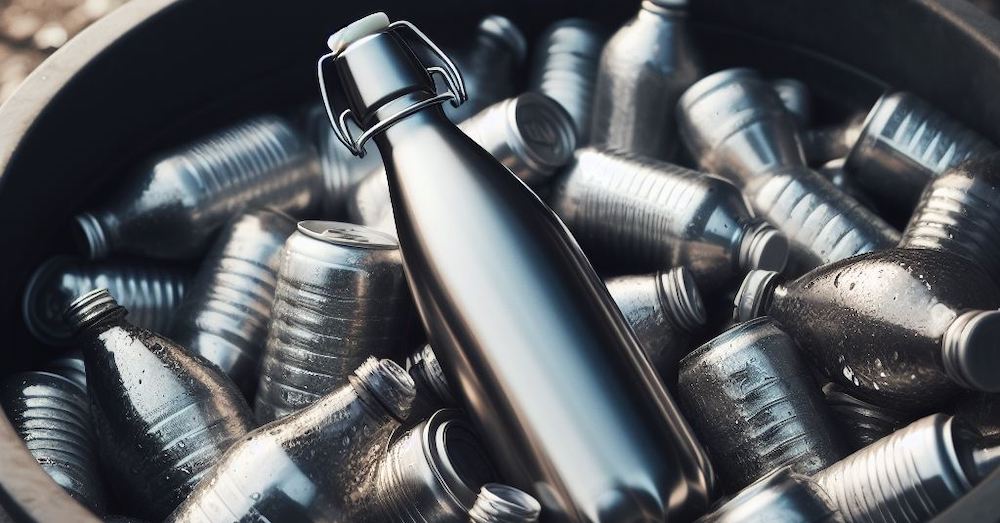You’ve probably bought a stainless steel bottle over the years to provide a durable, reusable, and healthier option for hydrating on the go. But now you have a collection of water bottles that have passed their prime. What do you do with your old ones? Can stainless steel bottles be recycled?
Stainless steel bottles can be recycled as it can be melted down and transformed into new products. Recycling prevents them from ending up in landfills, preserves valuable resources, and contributes to Australia’s National Waste Policy‘s goal of reducing the waste produced per person by 10% by 2030.
Here, I’ve explored the process of recycling stainless steel bottles, examining the benefits, challenges, and best practices for proper disposal.
Can Stainless Steel Bottles Be Recycled in Australia?
Yes, stainless steel bottles can and should be recycled.
Unlike single-use plastics, the good news is that stainless steel drink bottles are indeed included on Australia’s acceptable scrap metal recycling list.
This robust material can be repurposed multiple times without compromising its structural integrity, making it a valuable asset in the fight against environmental degradation.
How to Recycle Stainless Steel Bottles at Collins Recycling
Collins Recycling, Perth’s leading scrap metal recycling team, can help you recycle your stainless steel bottles through a straightforward and rewarding process. Follow this step-by-step guide to ensure your bottles find their way into the hands of experts.
1. Collect Your Scrap
Gather your stainless steel bottles and double-check they’re clean and free from contaminants or residue to ensure a more efficient recycling process.
While Collins Recycling’s experts handle the separation process, it helps if you can segregate stainless steel bottles from other materials during collection. Also, inspect them for any non-metallic elements. Removing labels and caps contributes to a cleaner recycling stream.
Then, load up your vehicle and take the first step toward helping the environment by bringing your collection to Collins Recycling’s facility in Perth.
2. Visit Our Recycling Yard
Collins Recycling takes pride in its user-friendly approach, designed to make the recycling experience accessible and positive for everyone. You’ll discover a welcoming atmosphere and helpful staff to guide you through the recycling process.
Your bottles will be weighed and sorted meticulously, ensuring they are ready for recycling. The bottles then enter the hands of skilled professionals who utilise cutting-edge technology to separate stainless steel from other materials, initiating the recycling process.
3. Get Cash for Your Stainless Steel Scrap
Collins Recycling can help you earn extra money as you make a difference for a greener future. Our friendly and knowledgeable staff will ensure you receive the best price for your stainless steel scrap metal.
The price of stainless steel can fluctuate due to industrial demand, the condition of the scrap, and the specific alloy of stainless steel. However, recycled stainless steel maintains a consistent level of demand.
Rest assured, we’ll treat you fairly with a top-dollar offer for your scrap and other metals. Contact us today for a free quote!
What are the Recycling Practices in Australia?
Australia used to export a significant amount of its waste to other countries, such as China, as a more cost-effective option than recycling locally. However, since January 2018, China has banned importing 24 types of solid waste.
As a result, Australia has been actively seeking alternative solutions for its waste disposal, such as increasing domestic recycling capacity.
Recently, Australia has made substantial strides in the recycling sector, with policies and initiatives in place to encourage the proper disposal of waste materials.
How Long Should You Keep Your Stainless Steel Water Bottles?
Typically, stainless steel water bottles can be used for around 10 to 12 years before they need replacement due to their inherent durability to withstand impacts without displaying signs of immediate wear and tear, corrosion resistance, and ability to resist stains.
How Eco-Friendly are Stainless Steel Bottles?
Since they provide a reliable means for reuse and do not contain harmful chemicals, eco-conscious consumers prefer stainless steel bottles over disposable plastic bottles.
Once their initial purpose has been fulfilled, up to 60% of the material in stainless steel products can be recycled and transformed into various items.
The Environmental Benefits of Water Bottle Recycling
With the growing concerns over environmental issues such as pollution and climate change, recycling has become an increasingly important aspect of waste management. Recycling stainless steel water bottles reduces waste and contributes to a cleaner and more sustainable planet in the following ways.
Energy Savings
The production of new stainless steel material requires significantly more energy than recycling. Plus, reprocessing doesn’t result in any deterioration of the metal. It’s possible to create brand-new stainless steel using 100% recycled stainless steel material.
Reduction in Landfill Waste
Metal water bottles that are discarded as waste and end up in landfills can take hundreds of years to decompose.
Conservation of Natural Resources
Stainless steel is made from iron ore, chromium, nickel, and other valuable metals. By recycling stainless steel water bottles, we can reduce the demand for raw materials and conserve natural resources, including minerals and fossil fuels.
Why You Should Take Your Stainless Steel Bottles to a Recycling Depot
Scrap metal recycling experts ensure that the recycling process is efficient and environmentally responsible in the following ways.
Proper Recycling Process
Stainless steel recycling depots have the necessary infrastructure and expertise to handle efficiently and process stainless steel scrap metal. They follow environmentally sound procedures to extract valuable metals and ensure the recycled material meets the required quality standards.
Legal and Ethical Compliance
Taking stainless steel scrap to a recycling depot ensures it is recycled per applicable laws and regulations. By using authorised facilities, you can have confidence that the recycling process meets environmental and safety guidelines, preventing the illegal disposal or mishandling of the material.
Maximising Recycling Potential
Recycling centres have the knowledge and equipment to extract the maximum value from stainless steel scrap. They can sort and separate different grades of stainless steel, removing contaminants and maximising the efficiency of the recycling process, resulting in higher-quality recycled material that can be used in various industries.
Conclusion
So, what are you waiting for? If you have stainless steel bottles you’d like to recycle, bring them down to Collins Recycling or give us a call to organise collection!









